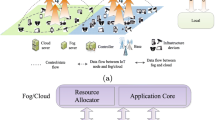Abstract
Fog computing offers a flexible solution for computational offloading for Internet of Things (IoT) services at the edge of wireless networks. It serves as a complement to traditional cloud computing, which is not cost-efficient for most offloaded tasks in IoT applications involving small-to-medium levels of computing tasks. Given the heterogeneity of tasks and resources in fog computing, it is vital to offload each task to an appropriate destination to fully utilize the potential benefit of this promising technology. In this paper, we propose a scalable priority-based index policy, referred to as the Prioritized Incremental Energy Rate (PIER), to optimize the energy efficiency of the network. We demonstrate that PIER is asymptotically optimal in a special case applicable for local areas with high volumes of homogeneous offloaded tasks and exponentially distributed task durations. In more general cases with statistically different offloaded tasks, we further demonstrate the improvement of PIER over benchmark policies in terms of energy efficiency and the robustness of PIER to different task duration distributions by extensive simulations. Our results show that PIER can perform better than benchmark policies in more than \(78.6\%\) of all simulation runs.
The work described in this paper is supported by Student Interdisciplinary Research Fund from BNU-HKBU United International College, College Research Grant from BNU-HKBU United International College R201911, and Zhuhai Basic and Applied Basic Research Foundation Grant ZH22017003200018PWC.
Access this chapter
Tax calculation will be finalised at checkout
Purchases are for personal use only
Similar content being viewed by others
Notes
- 1.
Orthogonal wireless channel allocations eliminate intra-cell interference and utilize frequency spectrum resources more efficiently.
- 2.
While the more general cases with non-negligible activation delay and power consumption can be addressed by integrating the vacation queuing model with activation cost and delay as in [14], they will complicate the analysis and we do not consider them in this paper due to the limited space.
References
Chang, Z., Liu, L., Guo, X., Sheng, Q.: Dynamic resource allocation and computation offloading for IoT fog computing system. IEEE Trans. Industr. Inf. 17(5), 3348–3357 (2020)
Deng, R., Lu, R., Lai, C., Luan, T.H., Liang, H.: Optimal workload allocation in fog-cloud computing toward balanced delay and power consumption. IEEE Internet Things J. 3(6), 1171–1181 (2016)
Du, J., Zhao, L., Feng, J., Chu, X.: Computation offloading and resource allocation in mixed fog/cloud computing systems with min-max fairness guarantee. IEEE Trans. Commun. 66(4), 1594–1608 (2017)
Fu, J., Moran, B., Taylor, P.: Restless bandits in action: resource allocation, competition and reservation. Oper. Res. 70(1), 416–431 (2021)
Fu, J., Moran, B.: Energy-efficient job-assignment policy with asymptotically guaranteed performance deviation. IEEE/ACM Trans. Netw. 28(3), 1325–1338 (2020)
Gao, B., Zhou, Z., Liu, F., Xu, F., Li, B.: An online framework for joint network selection and service placement in mobile edge computing. IEEE Trans. Mob. Comput. (2021)
Gillam, L., Katsaros, K., Dianati, M., Mouzakitis, A.: Exploring edges for connected and autonomous driving. In: IEEE Conference on Computer Communications Workshops (INFOCOM WKSHPS), IEEE INFOCOM 2018, pp. 148–153. IEEE (2018)
He, X., Wang, K., Huang, H., Miyazaki, T., Wang, Y., Guo, S.: Green resource allocation based on deep reinforcement learning in content-centric IoT. IEEE Trans. Emerg. Top. Comput. 8(3), 781–796 (2018)
Jalali, F., Hinton, K., Ayre, R., Alpcan, T., Tucker, R.S.: Fog computing may help to save energy in cloud computing. IEEE J. Sel. Areas Commun. 34(5), 1728–1739 (2016)
Kim, H.S.: Fog computing and the internet of things: extend the cloud to where the things are. Int. J. Cisco (2016)
Krishnasamy, S., Akhil, P., Arapostathis, A., Sundaresan, R., Shakkottai, S.: Augmenting max-weight with explicit learning for wireless scheduling with switching costs. IEEE/ACM Trans. Netw. 26(6), 2501–2514 (2018)
Mukherjee, M., Shu, L., Wang, D.: Survey of fog computing: fundamental, network applications, and research challenges. IEEE Commun. Surv. Tut. 20(3), 1826–1857 (2018)
Wang, Q., Fu, J., Wu, J., Moran, B., Zukerman, M.: Energy-efficient priority-based scheduling for wireless network slicing. In: 2018 IEEE Global Communications Conference (GLOBECOM), pp. 1–6. IEEE (2018)
Wu, J., Wong, E.W., Chan, Y.C., Zukerman, M.: Power consumption and GoS tradeoff in cellular mobile networks with base station sleeping and related performance studies. IEEE Trans. Green Commun. Netw. 4(4), 1024–1036 (2020)
You, C., Huang, K., Chae, H., Kim, B.H.: Energy-efficient resource allocation for mobile-edge computation offloading. IEEE Trans. Wirel. Commun. 16(3), 1397–1411 (2016)
Zhang, B., Chen, D.: Resource scheduling of green communication network for large sports events based on edge computing. Comput. Commun. 159, 299–309 (2020)
Author information
Authors and Affiliations
Corresponding author
Editor information
Editors and Affiliations
Rights and permissions
Copyright information
© 2022 Springer Nature Switzerland AG
About this paper
Cite this paper
Yin, J., Fu, J., Wu, J., Zheng, S. (2022). Energy Efficient Priority-Based Task Scheduling for Computation Offloading in Fog Computing. In: Lai, Y., Wang, T., Jiang, M., Xu, G., Liang, W., Castiglione, A. (eds) Algorithms and Architectures for Parallel Processing. ICA3PP 2021. Lecture Notes in Computer Science(), vol 13155. Springer, Cham. https://doi.org/10.1007/978-3-030-95384-3_35
Download citation
DOI: https://doi.org/10.1007/978-3-030-95384-3_35
Published:
Publisher Name: Springer, Cham
Print ISBN: 978-3-030-95383-6
Online ISBN: 978-3-030-95384-3
eBook Packages: Computer ScienceComputer Science (R0)




